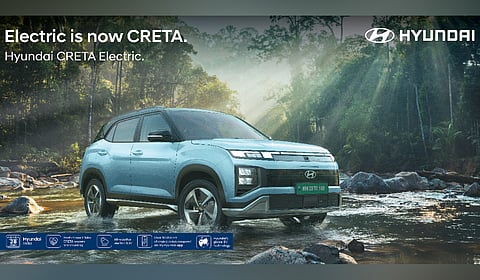

NEW DELHI: Hyundai Motor India’s (HMIL) first locally manufactured mass electric vehicle (EV) – the Creta Electric – will come with two battery packs – a 51.4 kWh (Long Range) offering a driving range of 473 km and a 42 kWh offering a driving range of 390 km in a single charge.
The company claims that the EV can be charged from 10% to 80% in just 58 minutes (DC charging), while the 11kW Smart Connected Wall Box charger can charge from 10%-100% in 4 hours (AC Home Charging).
The Korean automaker on Thursday revealed the much-anticipated product ahead of its expected debut at the Bharat Mobility Global Expo on 17 January. The Creta Electric will compete against Mahindra & Mahindra’s recently launched BE 6, Tata Motor’s Curvv, MG Motor’s ZS EV and the soon-to-be-launched Maruti Suzuki e-Vitara.
The specs revealed by Hyundai show that the Creta Electric is fitted with a smaller battery pack and gives a lower range when compared with peers (except for MG Motor’s ZS EV). The Mahindra BE 6, with its 79kWh and 59kWh options, gives a claimed range of 682 km and 556 km, respectively, and has the largest batteries in the segment. The Tata Curvv EV comes second as it gives a claimed range of 503 km with the larger 55kWh battery.
As per reports, the e-Vitara will be fitted with single and dual motor setups- a 49 kWh and a larger 61 kWh battery pack. Its range is expected to top the 500km mark.
Hyundai is banking on the strong brand reputation of the Creta, which has dominated the mid-size SUV market since its launch, achieving cumulative sales of over 1.1 million units.
“We are confident that the Hyundai CRETA Electric will set a new standard in quality for electric SUVs in India and will redefine the success of EVs in the country,” said Tarun Garg, Whole-Time Director and Chief Operating Officer, Hyundai Motor India Limited.
The CRETA Electric will also offer Vehicle-to-load (V2L) technology, enabling users to power external devices both inside and outside the vehicle. Hyundai said that it plans to have nearly 600 fast Public EV charging stations in the next 7 years accelerating early adoption of EVs.